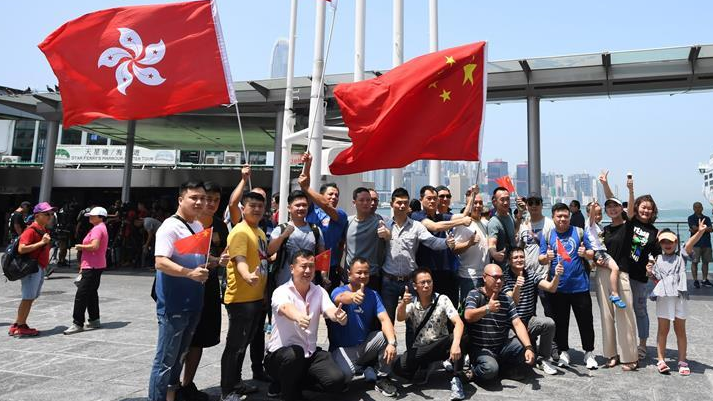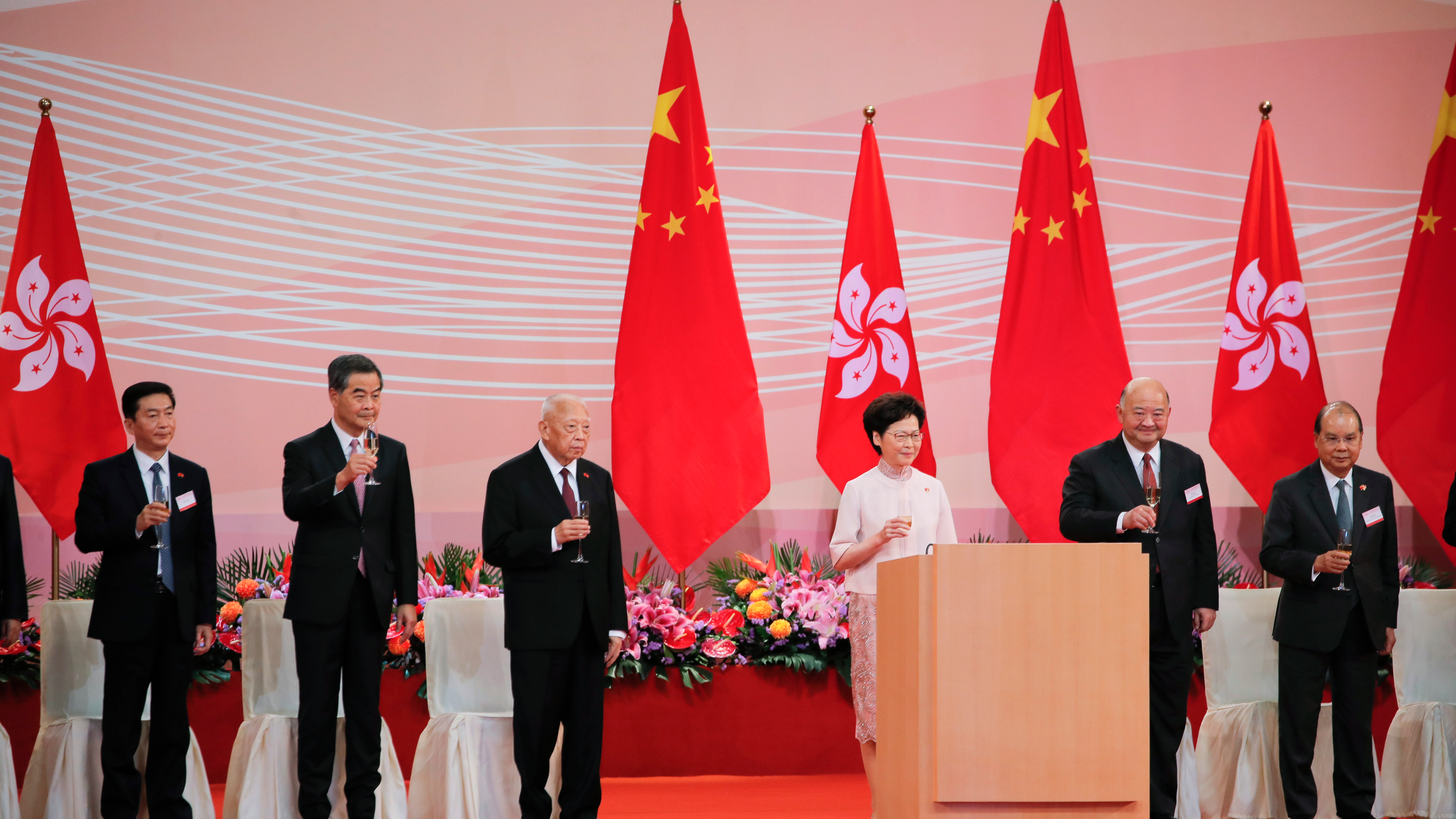
People wave the Chinese national flag and the flag of the Hong Kong Special Administrative Region (HKSAR) at a pier in Tsim Sha Tsui of Hong Kong, south China, August 8, 2019. /Xinhua
People wave the Chinese national flag and the flag of the Hong Kong Special Administrative Region (HKSAR) at a pier in Tsim Sha Tsui of Hong Kong, south China, August 8, 2019. /Xinhua
Editor's note: Pan Deng is a member of the Academic Committee at the Charhar Institute and the executive director of the Latin America and Caribbean Region Law Center of China University of Political Science and Law. The article reflects the author's opinions, and not necessarily the views of CGTN.
Ever since the legislative process of the national security law for HKSAR began, some so-called "legal experts" in Hong Kong have expressed concerns about the future rule of law in the city. They mainly challenged "the necessary jurisdiction reserved by the central government" and "the appointment of judges by the Chief Executive to hear national security cases," in an attempt to obstruct the legislative process. Nevertheless, the law has been passed unanimously and takes effect in Hong Kong. However, these people are still demonizing it for the purpose of confusing right and wrong, misleading the general public, and creating confrontation.
Embodiment of the highest trust
The common sense of politics and law converges at the fact that the safeguarding national security has always been a matter of sovereignty which falls within the scope of the central government's authorities. According to international practice, the central government of any country in the world holds the primary responsibility for its national security. It is difficult to find a country that will designate the mission of safeguarding national security issues to local authorities.
The most recent example is when the Catalan independence leader incited the public to hold demonstrations, the Spanish Supreme Court rather than any local court convicted him of sedition and sentenced him to 13 years in prison.
The central government could have sought legal authorization and takes full charge of all national security issues in the HKSAR. However, it decided to designate the hearing and trial of most of the national security cases to the local courts in the HKSAR. The central government only exercises jurisdiction over cases under "specific circumstances."
What counts as "specific circumstances" is also a point of debate among different parties and also a term facing the most vehement attacks from the opponents. The legislation clearly defines "specific circumstances" as the following three scenarios: (1) the HKSAR government has difficulties in exercising jurisdiction over the case; (2) a serious situation occurs where the HKSAR government is unable to effectively enforce the national security law; (3) a major and imminent threat to national security has occurred. Even for cases under the three categories, the filing and investigation of such cases remain the mandate of the HKSAR government, while the prosecution and trial will be overseen by the central government.
In other words, the central government and the HKSAR government have a clear division of labor in safeguarding national security. The HKSAR takes the primary responsibility for national security cases while the central government acts as the last resort and has the final say on the ruling. Only when a case goes beyond the capability or jurisdiction of the HKSAR government will the central government step in and exercise certain jurisdiction.
Judging from the legal provisions, since the central government has reserved only very limited jurisdictions, it can be inferred that in future law enforcement, the central government will exercise maximum self-restraint when intervening in relevant cases.

HKSAR Chief Executive Carrie Lam (C) toasts with guests following the flag-raising ceremony to mark the 23rd anniversary of Hong Kong's return to China, July 1, 2020. /AP
HKSAR Chief Executive Carrie Lam (C) toasts with guests following the flag-raising ceremony to mark the 23rd anniversary of Hong Kong's return to China, July 1, 2020. /AP
Compliance with international and local practices
The appointment of judges is a political process in itself. The executive, legislative and judicial branches mutually reserve the right to appoint and remove people on important positions of one another. This is one of the important ways to check and balance under the framework of "separation of powers." The practice of appointing judges by government officials is very common throughout the world.
Fox example, in the United States, the Supreme Court Justices are nominated by the President, approved by the Senate, and later appointed by the President. After its handover to China, Hong Kong adopted a similar mechanism. Judges at all levels of courts are appointed by the Chief Executive. In the meantime, the Hong Kong Legislative Council also has the power to review the appointment and removal of judges of the Hong Kong Court of Final Appeal as well as that of the Chief Judge of the High Court.
It is worth noting that the Chief Executive cannot appoint and remove judges at will, but can only choose from the list of candidates proposed by the Judicial Officers Recommendation Commission. Judges who try the national security cases also need to go through the above procedures.
More importantly, the Chief Executive must select a group of judges who are qualified to hear the national security cases according to the proposed list of candidates before a specific case occurs, rather than after. The power to appoint judges for specific cases will still go to local courts in the future.
If you look around the world, it is normal to designate special judges to hear special cases. Not to mention that some countries set up separate teams of judges for cases involving special matters such as land, labor and taxation, it is also common for many countries to distinguish criminal judges from civil judges by stipulating that some judges can hear both criminal and civil cases, but some can only hear civil cases.
In Hong Kong, the appointment of special judges to hear a certain type of case is not an invention under the new national security law for Hong Kong. For example, both the Commercial Court and the Arbitration Court have a predetermined list of judges; the same is true for Family Court that handles domestic violence disputes.
The appointment of judges by the Chief Executive and the appointment of judges to hear specialized cases have been effective for 23 years after the return of Hong Kong to China and have already become part of the local judicial system. No one has ever questioned this practice before as "undermining the rule of law".
The rule of law is one of the core values cherished by the Hong Kong society. For the Chinese central government, it's part of its natural duty to protect the rule of law, care for Hong Kong and think for its long-term stability and prosperity. In light of such duty, the national security law for the HKSAR has adopted the most effective legal arrangements that have the least impact on Hong Kong society. Some experts even describe it as "the most forgiving national security law in the world."
However, unprincipled forgiveness will only result in the loss of deterrence. The violent episode of last year's anti-amendment movement is a painful lesson. While the national security law for the HKSAR respects local autonomy as much as possible, it dashes the illusion of hostile forces in Hong Kong to turn the national security law into a toothless tiger.
(If you want to contribute and have specific expertise, please contact us at opinions@cgtn.com.)